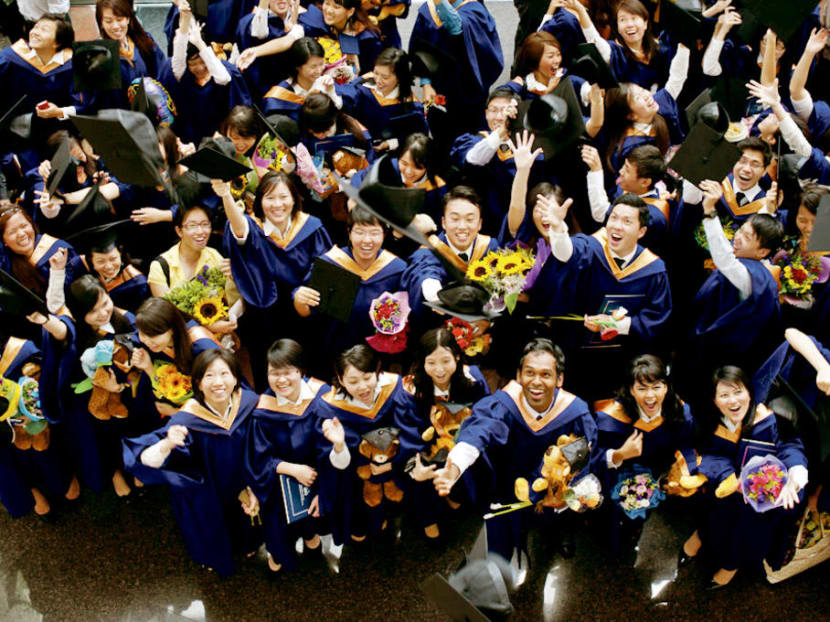Ranking system for universities should go ‘way beyond publications and citations’
SINGAPORE — To measure the quality of a university, international rankings should also assess the institution based on its collaboration with industries, society and the government, as well as whether it is making an impact, said Education Minister Ong Ye Kung on Wednesday (Sept 26).

Students graduating from the National University of Singapore (NUS). Speaking at an education conference, Education Minister Ong Ye Kung said he hopes international rankings would place more weight on universities' collaboration with industries, society and government.
SINGAPORE — To measure the quality of a university, international rankings should also assess the institution based on its collaboration with industries, society and the government, as well as whether it is making an impact, said Education Minister Ong Ye Kung on Wednesday (Sept 26).
Speaking at an education conference at the National University of Singapore organised by Times Higher Education, which publishes an annual world university rankings, Mr Ong said that international rankings currently place more weight on the quality of academic papers published by a university.
“So, if there is a change I wish for or an improvement I wish for in the international ranking system for universities, it will be to evaluate the effectiveness of a university in collaborating with the world outside of academia — industries, society, communities, Government — and delivering impact in all these sectors,” said Mr Ong.
“This will go way beyond publications and citations, which are the easiest to measure today and (which) we may have relied on quite a lot.”
Such collaborations could include combining the practical expertise of the various industries and academic research “to seek the next competitive breakthroughs and innovations”.
He pointed out, for instance, that there is a great potential for collaboration in social sciences and the humanities for academia, the social services sector, communities and governments.
Globalisation has placed much stress on societies, with issues such as far-right parties gaining ground in many countries and riding on identity politics. Inequality and social stratification are also issues which mature societies are grappling with.
Mr Ong said researchers in the social sciences and humanities need to examine issues of the day “in a robust, evidence-based, scientifically rigorous, outcome-focused way”.
“In this pursuit we should allay the worries that a social scientist has no future doing local research”, he added.
Universities could also encourage a flow of talent between sectors.
Mr Ong cited examples such as how experts from tech giant Alibaba are now teaching artificial intelligence at the Nanyang Technological University. The Harvard Kennedy School also encourages its faculty members to join the government for several years and for government officials to teach at the school.
Reiterating that the methodology used to determine international university rankings “needs to be enhanced”, he said there is a realisation that “lifelong learning will change the rhythm and mix of education”.
More effort is required to make university education experiential, said Mr Ong. The current ranking system, he noted, might “unintentionally” give the impression “that there is only one research-based model of success for universities”.
In June, Mr Ong had made a similar call for a university’s performance to be measured using “different kinds of metrics” to better gauge their success and achievements.
At the minimum, a new metric should reflect three major focus areas — the value of a degree education, lifelong learning, and impactful research, he said at the time.
During a dialogue session on Wednesday, Mr Ong was asked whether graduate employment outcomes should be one of the factors taken into account in international rankings of universities.
He replied that “we have not quite cracked this issue (of) how to measure quality of education”. Getting students' feedback on this issue at the end of a lesson would be “highly inaccurate”, as the impact of education on students tends to be known only years after they have graduated.
“So, I think you need a combination of both immediate feedback, employment outcomes upon graduation and more long-term longitudinal studies for students to express what was the true quality of education and how did that affect them for the rest of their lives,” said Mr Ong.
“I hope ranking organisations like (Times Higher Education) can help crack this problem and find a way that we can evaluate, in an objective, (evidence-based) way, the quality of education.”
Earlier this month, Times Higher Education announced that it will introduce a new ranking that aims to measure universities’ success in delivering the United Nations’ Sustainable Development Goals.
The pilot ranking will be announced next April. It will focus on global partnerships, quality education, climate action, innovation and infrastructure, among other goals.
Data will come from sources including direct submissions from the universities, datasets from information and analytics firm Elsevier and possibly a reputation survey, said Times Higher Education.
Sign up for TODAY's WhatsApp service. Click here:






